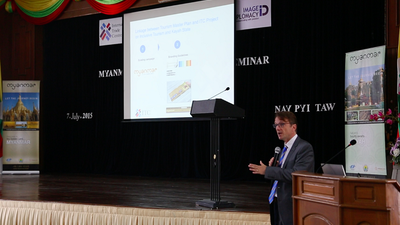Fostering sustainability in tourism
Tourism is one of the largest and fastest-growing economic sectors worldwide and its expansion is expected to continue. International tourist arrivals will increase by 3.3% annually over the next 15 years and reach an estimated 1.8 billion in 2030, the World Tourism Organization (UNWTO) has said. Further, destinations in emerging economies are expected to rise at double the pace (4.4% per year) of those in advanced economies (2.2% per year).
The industry is potentially a key driver of socioeconomic development, mainly for export revenue generation, infrastructure development and job creation. However, perhaps its greatest potential in that regard lies in its complexity. Making tourism work requires significant resources and the provision of a variety of goods and services. The industry also brings together a plethora of stakeholders, from multinational companies to small and medium-sized enterprises (SMEs) in local markets.
Every tourism-related sale to a foreign visitor represents an export. As such, the sector provides an important opportunity for integration in the world economy, especially for SMEs that otherwise would not have the chance to be part of a global supply chain.
Sustainable tourism and voluntary standards
There is, however, increasing awareness of tourism’s adverse consequences, especially its strains on communities and the environment. To make use of the sector’s immense potential its development must be carefully managed, with sustainability goals at its core.
Much progress has been made in this regard over the past two decades. Travelers are showing increased interest in environmentally and socially responsible forms of tourism, while operators, hotels and local communities are offering more sustainable services. This evolution is clearly illustrated by the emergence of concepts such as eco-tourism, responsible tourism, and green travel. Similar to the agriculture or textile sector, voluntary sustainability standards, codes and labels have become the most accepted means to transform these rather ambiguous terms into reliable information. There are more than 400 sustainability standards promoting a broad variety of criteria in the areas of environment, human rights and labour standards, among others.
Standards Map
The International Trade Centre’s (ITC) Standards Map (www.standardsmap.org) assists service providers and tour operators by helping them through the maze of available standards. Service providers can use the tool to identify the standards applicable to them and prepare in-depth self-assessments to get a better understanding of where they stand.
Standards Map also enables organizations to compare their guidelines with criteria set out by the Global Sustainable Tourism Council (GSTC). The GSTC was initiated by the Rainforest Alliance, the United Nations Environment Programme, the United Nations Foundation, and UNWTO in 2008 with the adoption and creation of universal principles for sustainable tourism being one of its key objectives.
Standards recognized by the organization are considered equivalent to minimum requirements in that they have taken into account the socioeconomic, cultural, and environmental impacts of tourism as well as sustainable management. GSTC recognition is a fundamental step towards a much-needed globally accepted definition of sustainable tourism. In the past, benchmarking themselves against GSTC criteria proved too time-consuming and difficult for many of the non-profit organizations. With the help of Standards Map, standard organizations can now easily analyze whether they comply with GSTC benchmarks and, if not, which areas might need improvement.
‘GSTC criteria have become the barometer for best practice and are of absolute importance for the industry,' said Kathy Bergs, general manager of Fair Trade Tourism, a South African standard organization known for its groundbreaking work in the tourism certification segment. ‘GSTC recognition used to be a tedious paper exercise but ITC has actually taken the pain out of this process.’







